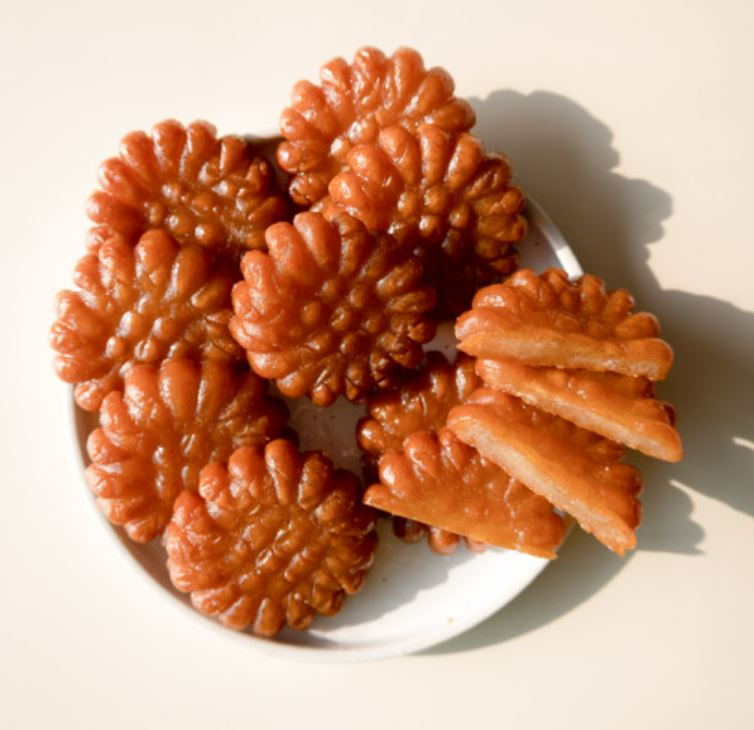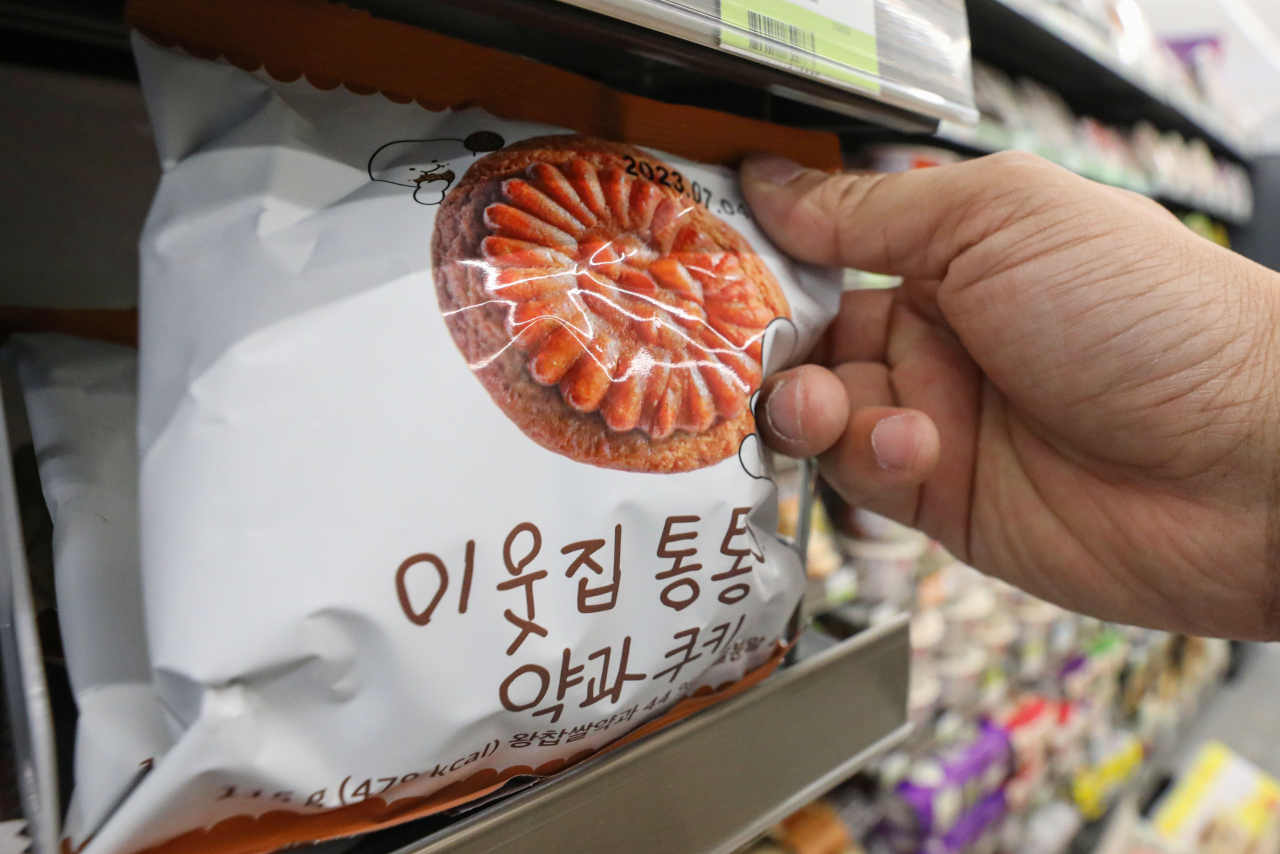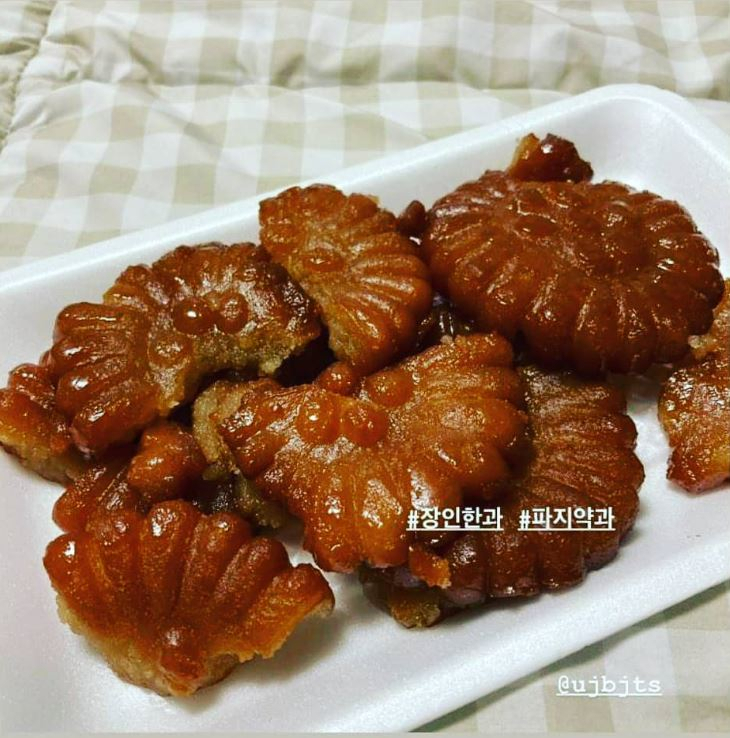 |
A yakgwa product sold by Bomnal&Yakgwa (Bomnal&Yakgwa) |
One chilly autumn afternoon in October, students of Sookmyung Women's University in Seoul poured out onto the streets for lunch. A group found their way into a small bakery by the name of Monday Picnic down an alley, where they treated themselves to yakgwa financier cakes.
“I have never really been a fan of yakgwa, but I became curious after it started trending. From yakgwa cookies and financier to ice cream, there are several forms, and they're all pretty good,” said Jo Min-jeong, a 25-year-old college student.
Yakgwa, a traditional honey-glazed cookie that has commonly been used for ancestral rituals, is among the old-timey snacks that have been gaining fresh popularity in South Korea recently. Local retailers have already moved to cash in on the recent fad, with GS25's Haengun Yakgwa snacks selling over 3 million bags since its June launch.
The latest yakgwa craze stands apart from the retro trend that has boosted the popularity of pre-2010s pop culture content. It is prevalent among a young population today who do not have the strong connection to the snack as generations past.
One would have to trace further back into the 20th century to find a generation who frequently enjoyed the honey cookies. Other than conscripted soldiers -- who only had access to a handful of munchies in the barracks -- about the only time one could find yakgwa was during such aforementioned rituals.
But thanks to social media, especially YouTube and TikTok, the snack that dates to the Goryeo Kingdom (918-1392) has come back into prominence among the young generation of South Korea today who call themselves “halmaenials” -- a combination of the Korean word for "granny" and "millennials" that refers to youngsters with a nostalgic taste that reminds them of their grandparents.
The popularity of yakgwa does not depend on the power of nostalgia of those who had enjoyed it in their youth, but rests on the back of the "newtro" trend sweeping across the youth in Korea. It is defined by reinterpretation of vintage or retro lifestyles, which means yakgwa is back -- but it has taken on a new form in the recent craze.
 |
A yakgwa snack product is sold at a convenience store in Seoul on May 15. (Newsis) |
Yakgwa trend among young
Booking concert tickets online for popular singers in Korea is a challenge that borders on impossibility: IU recently uploaded a video of her booking tickets for her own concert, which showed the seats disappearing within seconds of sales opening.
The newly coined “yak-keting” -- "yakgwa" plus "ticketing” -- refers to the act of frantically clicking for online reservations of yakgwa snacks from popular bakeries. Boutique companies such as Jangin Hangwa take online reservations for yakgwa products at 5 p.m. on Mondays, Wednesdays and Fridays, which become fully booked within moments.
Popular yakgwa brands usually add their own signature touches to differentiate themselves from other products. Bomnal&Yakgwa features frozen yakgwa promoted as “crunchy on the outside and chewy on the inside,” and like other popular yakgwa online shops, sells their products on a reservation basis.
The brand's owner is an influencer who is among those who made yakgwa cool for the younger generation -- YouTuber Jeong Hye-yeong, who goes by "Yeosu Unnie.” The YouTuber has been a yakgwa advocate, collaborating with Hyundai Department Store for a pop-up shop while introducing yakgwa recipes.
Yakgwa's nationwide popularity is nothing new. In fact, Goryeo King Gongmin actually issued a countrywide ban on making yakgwa in the 14th century, as excessive yakgwa consumption was causing a shortage of wheat, honey and sesame oil. As rice farming made up most agriculture on the Korean Peninsula at the time, wheat products mostly relied on Chinese imports.
Yakgwa's forbidden popularity extended into the following Joseon era (1392-1910), and some kings decreed that those who were caught making yakgwa during the ban would be punished with severe flogging.
 |
Jangin Hangwa (Instagram) |
Despite being an old-timey munchie, an overwhelming majority of yakgwa lovers now can be found among the youth. Local convenience store CU's yakgwa sales for April were 12.5 times those of April last year, and 40.9 percent of sales were to customers in their 20s, while another 42.2 percent were sold to 30-somethings.
SPC Samlip, one of the bigger food and beverage companies in the country, recently rolled out its latest K-dessert products at the Anuga trade fair in Cologne, Germany, and the company said the yakgwa products sparked the biggest reactions.
Some experts say yakgwa has a special appeal to the younger generation here.
“Yakgwa is perceived generally as being made by hand, leading young people to see it as a type of 'classy' dessert that is not very detrimental to health,” said Lee Eun-hee, a professor of consumer science at Inha University.
“(Yakgwa) is easy to carry around, and can be enjoyed in various formats. It has a lot of elements that can appeal to young people.”






![[Weekender] Korea's traditional sauce culture gains global recognition](http://res.heraldm.com/phpwas/restmb_idxmake.php?idx=644&simg=/content/image/2024/11/21/20241121050153_0.jpg)
